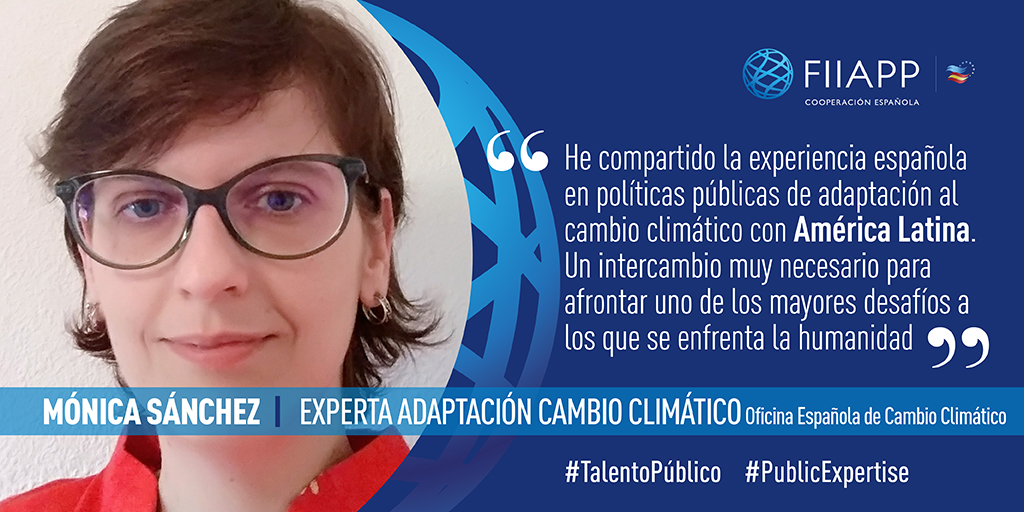-
27 July 2021
Category : Interview
#PublicExpertise: sharing the adaptation to climate change experience
Spain is sharing its experience in climate change adaptation policies with Latin America through public cooperation between public bodies
 Spain is sharing its experience in climate change adaptation policies with Latin America through public cooperation between public bodies
Spain is sharing its experience in climate change adaptation policies with Latin America through public cooperation between public bodiesWe interviewed Mónica Sánchez, a climate change adaptation expert at the Spanish Ministry of Ecological Transition and Demographic Challenge’s Office for Climate Change. Sánchez has worked in Latin America through the EUROCLIMA+ project and is part of the FIIAPP #PublicTalent initiative which is running in over 100 countries.
What has been the greatest achievement of your experience as an expert working abroad?
The most interesting thing is being able to share the Spanish experience in public policy matters for adaptation to climate change with other countries, as well as learning about their experiences when addressing the common challenges that we face. Adaptation to climate change is an area undergoing major development. It is important that spaces are created in which to exchange technical knowledge at both a methodological and practical level. The Spanish experience in the assessment of the previous National Climate Change Adaptation Plan and the preparation of a new, recently approved one, the development of tools such as the AdapteCCa climate change platform and specific sector initiatives, including health and climate change indicators and the National Plan for High Temperature Preventive Action, developed by the Spanish Ministry of Health, are all processes that can inspire the development of adaptation policies in other countries, just as their experiences inspire us in the design and development of ours.
What are you most proud of?
I believe that the actions in which I have been involved have fostered the exchange of both positive experiences and lessons learned in a highly technical and common learning environment. Adaptation is an area in which there are still many aspects to be defined, so I find it very enriching to have been able to share my experience with technical representatives from other countries. I have also had the opportunity to discuss different approaches and methodologies, as well as challenges that we still have to address, both with counterparts from other countries and with specialists in the field. I think that all the people who have been involved should feel proud of having managed to create this environment of learning and trust.
How has your assignment helped to improve the lives of people and the planet?
Climate change is one of the greatest challenges facing humankind, affecting practically all human activities and natural systems, with an impact that is most severe in the most vulnerable countries. Through strategies to adapt to climate change, we contribute to preventing and reducing the risks posed by climate change and to building more resilient societies. Generally speaking, adaptation policies and measures also have multiple associated co-benefits, from improving people’s health and quality of life to conserving biodiversity and the health of ecosystems. All the progress we make to improve the adaptive capacity of countries is an achievement when it comes to coping with the current and future impact of climate change at a global level, not only for current generations but also for future generations.
What is the main value of the public aspect for you?
For me, the main thing is serving the general interest, with a focus on achieving collective goals that involve all actors in society. The climate emergency that we are experiencing requires coordinated and coherent collective action that can be quickly implemented and maintained in the long term, that is ambitious and systemic, that involves all sectors and at all levels and that allows us to achieve climate neutrality and adapt to the effects of climate change in a fair and sustainable way. These objectives must be achieved globally, so cooperation is absolutely essential. To face a challenge like this, the value of the public sector is undeniable, although it will not be possible without the collaboration of the rest of the actors in society.
What have you learned from this experience?
Many things. I have found it very enriching to share experiences on common technical challenges that all countries need to tackle in emerging matters such as monitoring adaptation or establishing indicators. I have also learned a lot about different governance schemes and participatory processes that set out and monitor adaptation policies from the experiences gleaned from countries that have a long tradition of developing this type of initiative. I should also mention the methodological issues arising from the expert knowledge provided by specialists from different fields, to which I can add the personal learning process involved in participating in such experiences. In general, I consider them to be very enriching experiences for all the people involved, both professionally and personally.
The views and opinions expressed in this blog are the sole responsibility of the person who write them.






